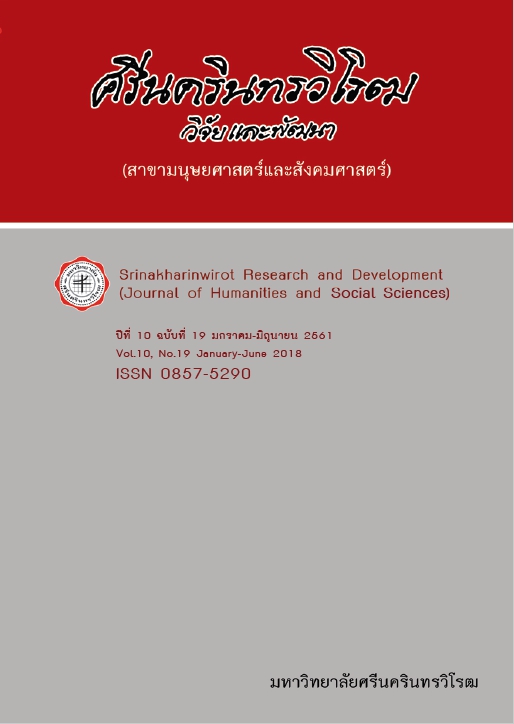วัฒนธรรมองค์การ การสนับสนุนจากองค์การ ความยึดมั่นผูกพันในงาน และพฤติกรรม การเป็นสมาชิกที่ดีขององค์การของพนักงานระดับปฏิบัติการเจนเนอเรชั่นวายของธนาคารแห่งหนึ่ง (ORGANIZATIONAL CULTURE, ORGANIZATIONAL SUPPORT, WORK ENGAGEMENT AND ORGANIZATIONAL CITIZENSHIP
Keywords:
Organizational Culture, Organizational Support, Work Engagement, Organizational Citizenship Behavior and Generation YAbstract
The objectives of this research were to study: the relationship between the organizational culture, organizational support, work engagement and organizational citizenship behavior and the organizational culture, organizational support, work engagement can predict organizational citizenship behavior. Samples were 265 generation Y’s operational employees of the Bank. Data were collected by questionnaires and analyzed by application program of computer. Statistics used were percentage, mean, standard division, Pearson’s product moment correlation coefficient, and stepwise multiple regression analysis. Result showed that: organizational culture, organizational support, work engagement of operational employee were positively correlated with organizational citizenship behavior at 0.01 level of significantly; and work engagement and organizational culture of social responsibility of operational employees could jointly predict 50.70 percent of organizational citizenship behavior.
Downloads
References
[2] Petroulas, Emma; Brown, David and Sundi, Heidi. (2010, September). Generational Characteristics and Their Impact on Preference for Management Control Systems. Australian Accounting Review. 20(3): 221-240.
[3] เดชา เดชะวัฒนไพศาล. (2552, กรกฎาคม-กันยายน). การรับรู้คุณลักษณะของเจนเนอเรชั่นวายและแรงจูงใจในการทำงาน: มุมมองระหว่างเจนเนอเรชั่นต่างๆ ในองค์การ. จุฬาลงกรณ์ธุรกิจปริทัศน์. 31(121): 1-24.
[4] ลือรัตน์ อนุรัตน์พานิช. (2558, มกราคม-เมษายน). ทัศนคติต่อ Generation Y ของผู้เข้าร่วมอบรมเรื่อง เข้าใจ ผูกพัน รักษา จูงใจ Generation Y. วารสารวิชาการ Veridian E-Journal. 8(1): 38-46.
[5] เดชา เดชะวัฒนไพศาล. (2551, กรกฎาคม-กันยายน). เจนเนอเรชั่นวายกับความท้าทายใหม่ในการบริหารทรัพยากรบุคคล. จุฬาลงกรณ์วารสาร. 20(80): 53-66.
[6] ชูชัย สมิทธิไกร. (2554). จิตวิทยาอุตสาหกรรมและองค์การ. กรุงเทพฯ: สำนักพิมพ์แห่งจุฬาลงกรณ์มหาวิทยาลัย.
[7] George, Jennifer M; and Jones, Gareth R. (1999). Understanding and Managing Organizational Behavior. 2nd ed. Massachusetts: Addison-Wesley, Inc.
[8] George, Jennifer M; and Jones, Gareth R. (2005). Understanding and Managing: Organizational Behavior. 4th ed. New Jersey: Pearson Prentice Hall, Inc.
[9] สฎายุ ธีระวณิชตระกูล. (2547, มิถุนายน-ตุลาคม). การส่งเสริมพฤติกรรมการเป็นสมาชิกที่ดีขององค์การสู่การพัฒนาทรัพยากรมนุษย์ในองค์การอย่างยั่งยืน. วารสารศึกษาศาสตร์ มหาวิทยาลัยบูรพา.16(1): 15-28.
[10] สุกัญญา รัศมีธรรมโชติ. (2549, มีนาคม-เมษายน). เบื้องหลังการลาออก: ปริศนาที่องค์การไม่เคยล่วงรู้. โปรดักทิวิตี้ เวิลด์ (Productivity world). 11(61): 74-80. สืบค้นเมื่อ 20 กันยายน 2557, จาก http://202.183.190.2/FTPiWebAdmin/knw_pworld/image_content/61/Human61.doc
[11] Begin, Stephen D. (2007). Organizational Culture Counts. Ottawa: HRSB Concepts Inc.
[12] Newstrom, John W; and Davis, Keith. (2007). Organizational Behavior: Human Behavior at Work.11th ed. New York: McGraw-Hill.
[13] Sathe, Vijay. (1983). Implication of Corporate Culture: A Manager’s Guide to Action. Organizational Dynamics. 12: 5-23.
[14] ธรรมรัตน์ อยู่พรต. (2556, มกราคม-มิถุนายน). การรับรู้การสนับสนุนจากองค์การและการรับรู้การสนับสนุนจากหัวหน้างานที่ส่งผลต่อพฤติกรรมการเป็นสมาชิกที่ดีขององค์การของเจนเนอเรชั่นต่างๆ. วารสารปัญญาภิวัฒน์. 4(2): 24-39.
[15] Eisenberger, Robert; Armeli, Stephen; Rexwinkel, Barbara; Lynch, Patrick D; and Rhoades, Linda. (2001, March). Reciprocation of Perceived Organizational Support. Journal of Applied Psychology. 86(1): 42-51.
[16] บดินทร์ หาญบุญทรง; และ พวงเพชร์ วัชรอยู่. (2555, มกราคม-มิถุนายน). ปัจจัยส่วนบุคคล บุคลิกภาพห้าองค์ประกอบ การรับรู้การสนับสนุนขององค์การกับพฤติกรรมการเป็นสมาชิกที่ดีขององค์การของข้าราชการในสำนักงานปลัดกระทรวงมหาดไทย. วารสารสังคมศาสตร์และมนุษยศาสตร์. 38(1): 180-198.
[17] Liu, Yuwen. (2009, April). Perceived Organizational Support and Expatriate Organizational Citizenship Behavior: The Mediating Role of Affective Commitment Towards the Parent Company. Personnel Review. 38(3): 307-319.
[18] Miao, Ren-Tao. (2011, January). Perceived Organizational Support, Job Satisfaction, Task Performance and Organizational Citizenship Behavior in China. Journal of Behavioral and Applied Management. 12(2): 105-127.
[19] Chiang, Chun-Fang; and Hsieh Tsung-Sheng. (2012, March). The Impacts of Perceived Organizational Support and Psychological Empowerment on Job Performance: The Mediating Effects of Organizational Citizenship Behavior. International Journal of Hospitality Management. 31: 180-190.
[20] Mathumbu, Dumisani; and Dodd, Nicole. (2013). Perceived Organizational Support, Work Engagement and Organizational Citizenship Behaviors of Nurses at Victoria Hospital. Journal of Psychology. 4(2): 87-93.
[21] ธนพร แย้มสุดา. (2550). ความยึดมั่นผูกพันต่อองค์การของบุคลากรกรมแพทย์ทหารเรือ. กรุงเทพฯ: กรมแพทย์ทหารเรือ.
[22] May, Douglas R; Gilson, Richard L; and Harter, Lynn M. (2004, March). The Psychological Condition of Meaningfulness, Safety and Availability and the Engagement of the Human Spirit at Work. Journal of Occupational and Organizational Psychology. 77: 11-37.
[23] Eisenberger, Robert; Huntington, Robin; Hutchison, Steven; and Sowa, Debora. (1986). Perceived Organizational Support. Journal of Applied Psychology. 71(3): 500-507.
[24] Schaufeli, Wilmar B; and Bakker, Arnold B. (2003). Utrecht Work Engagement Scale. Utrecht: Utrecht University Press.
[25] Organ, Dennis W; and Bateman, Thomas S. (1991). Organizational Behavior. 4th ed. Homewood: Irwin, Inc.
[26] สุชาติ ประสิทธิ์รัฐสินธุ์. (2555). ระเบียบวิธีวิจัยทางสังคมศาสตร์. กรุงเทพฯ: เฟื่องฟ้าพริ้นติ้ง จำกัด.
[27] สุชาติ ประสิทธิ์รัฐสินธุ์. (2550). ระเบียบวิธีการวิจัยทางสังคมศาสตร์. กรุงเทพฯ: ห้างหุ้นส่วนจำกัดสามลดา.
[28] Schmeling, Elke. (2001). Good Citizens in a Global Economy: Individual-Collectivism and Power Distance as Predictors of Organizational Citizenship Behavior. Dissertation. Ph.D. (Psychology). Germany: University of Konstanz.
[29] Stamper, Christina L; and Van Dyne, Linn. (2001, June). Work Status and OCB: A Field Study of Restaurant Employees. Journal of Organizational Behavior. 22(5): 517-536.
[30] Kidder, Deborah. (2002, October). The Influence of Gender on the Performance of Organizational Citizenship Behavior. Journal of Management. 28(5): 629-648.
[31] รชฏ ชยสดมภ์. (2550). ความสัมพันธ์ระหว่างการรับรู้การสนับสนุนจากองค์การ พฤติกรรมการเป็นสมาชิกที่ดีขององค์การ และความผูกพันต่อองค์การ: กรณีศึกษาโรงงานอุตสาหกรรมผลิตชิ้นส่วนอิเล็กทรอนิกส์แห่งหนึ่ง. วิทยานิพนธ์ ศศ.ม. (จิตวิทยาอุตสาหกรรมและองค์การ). กรุงเทพฯ: คณะศิลปะศาสตร์ มหาวิทยาลัยธรรมศาสตร์.
[32] วรางคณา แก้วมณี. (2554). ความสัมพันธ์ระหว่างการรับรู้การสนับสนุนจากองค์การ ความยึดมั่นผูกพันในงานและพฤติกรรมการเป็นสมาชิกที่ดีขององค์การ: กรณีศึกษาโรงพยาบาลรัฐบาลแห่งหนึ่งในจังหวัดสมุทรปราการ. วิทยานิพนธ์ ศศ.ม. (จิตวิทยาอุตสาหกรรมและองค์การ). กรุงเทพฯ: คณะศิลปะศาสตร์ มหาวิทยาลัยธรรมศาสตร์.
[33] Lavelle, James J; Rupp, Deborah E; and Brockner, Brockner. (2007, December). Taking a Multifoci Approach to the Study of Justice, Social Exchange, and Citizenship Behavior: the Target Similarity Model. Journal of Management. 33(6): 841-866.
[34] Schaufeli, Wilmar B; Salanova, Marisa; Gonzales-Roma, Vicente; and Bakker, Arnold B. (2002, March). The Measurement of Engagement and Burnout: A Two Sample Confirmatory Factor Analytic Approach. Journal of Happiness Studies. 3: 71-92.
[35] Babcock-Roberson, Meredith E; and Strickland Oriel J. (2010, May-June). The Relationship Between Charismatic Leadership, Work Engagement, and Organizational Citizenship Behaviors. The Journal of Psychology. 144(3): 313–326.
[36] Ariani, Dorothea W. (2013, March). The Relationship between Employee Engagement, Organizational Citizenship Behavior, and Counterproductive Work Behavior. International Journal of Business Administration. 4(2): 46-56.
[37] Chughtai, Aamir A. (2008, January). Impact of Job Involvement on In-Role Job Performance and Organizational Citizenship Behaviour. Institute of Behavioral and Applied Management. 169-183.
Downloads
Published
How to Cite
Issue
Section
License
Srinakharinwirot Research and Development Journal of Humanities and Social Sciences is licensed Under a Creative Commons Attribution-NonCommercial-NoDerivs 4.0 International (CC-BY-NC-ND 4.0) License, Unless Otherwise Stated. Please Read Journal Policies Page for More Information on Open Access, Copyright and Permissions.



